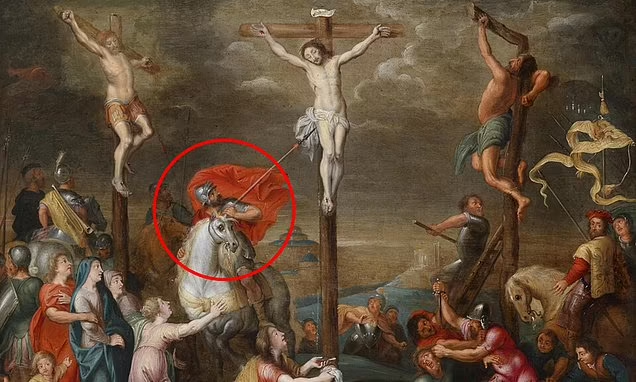VATICAN CITY — A banned biblical text known as the Gospel of Nicodemus alleges that the Roman soldier who delivered the final blow to Jesus Christ during the crucifixion was a man named Longinus, a figure absent from the canonical Gospels but revered in Christian legend.

The Gospel of Nicodemus, also called the Acts of Pilate, is an apocryphal text excluded from the Bible due to questions over its authorship, theological alignment, and date of origin. Yet within its pages lies a controversial detail: it identifies Longinus as the soldier who pierced Jesus’ side with a spear, fulfilling the account in John 19:34 — “But one of the soldiers pierced His side with a spear, and immediately blood and water came out.”
Though the canonical Gospels do not name this soldier, Christian tradition has long associated Longinus with the moment of divine revelation at the foot of the cross. According to legend, he witnessed the supernatural signs accompanying Jesus’ death and became a believer, later spreading the gospel before being martyred for his faith.
While there is no historical proof that Longinus was a real person, his legend endured through centuries of oral tradition, eventually influencing Christian art and devotion. Today, a striking statue of Longinus stands in Saint Peter’s Basilica in Vatican City, symbolizing his transformation from executioner to saint.

His story has recently gained renewed attention after being featured in the Sunday Cool podcast, which explored his conversion and role in early Christian narratives.
Longinus is believed to have been a centurion under Pontius Pilate, the Roman governor who authorized Jesus’ execution. Tradition holds that after Jesus died, Longinus used his spear to confirm death by piercing Jesus’ side — an act that symbolically revealed both Christ’s humanity and divinity.
According to the Eastern Orthodox Church, Longinus is also attributed with declaring, “Truly this was the Son of God,” echoing Matthew 27:54, moments after an earthquake followed Jesus’ final breath.
Some versions of the story even claim Longinus was nearly blind, but when the blood and water from Christ’s side touched his face, his sight was restored, cementing his transformation into a believer.
Following Jesus’ resurrection, Longinus was said to be among the soldiers assigned to guard the tomb. As described in traditional scripture, the guards fled in fear when Jesus rose. But according to Christian legend, Longinus refused bribes from Jewish authorities who sought to suppress the resurrection story.

He allegedly returned to his homeland in Cappadocia, modern-day Turkey, where he preached the message of the risen Christ. Eventually arrested for his faith, he reportedly endured gruesome torture — his teeth were pulled, his tongue cut out — but he miraculously continued speaking the gospel. He was ultimately beheaded, sealing his place in Christian martyrdom.
Longinus’ story is just one of many found in texts excluded from the Bible. Another such text, the Book of Jubilees, offers a dramatic reinterpretation of the Genesis flood narrative. While Genesis attributes the global deluge to widespread wickedness, Jubilees blames “the Watchers” — fallen angels who took human wives and bore giants.
These giants, according to the text, devoured all living things, ushering in an age of cannibalism and corruption. Jubilees 10:25 states: “And the Lord destroyed everything from off the face of the earth; because of the wickedness of their deeds…”
The Book of Jubilees was unearthed among the Dead Sea Scrolls near Qumran, roughly 15 miles east of Jerusalem. Despite retelling parts of Genesis and Exodus, it was rejected by both Jewish and Christian authorities for its supernatural claims and lack of apostolic authorship.
While mainstream Christianity has not canonized the story of Longinus, his legend survives — not in scripture, but in statues, sermons, and sacred storytelling. His transformation from Roman executioner to devout martyr remains a powerful symbol of redemption and belief born at the foot of the cross.
Source: dailymail.co.uk



